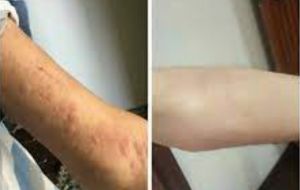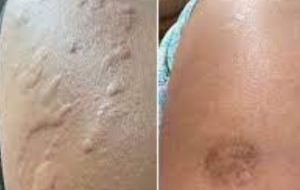Urticaria, widely recognized as hives, is a multifaceted and often perplexing skin condition that manifests as the abrupt and unpredictable emergence of red, itchy and raised welts on the skin. These welts can display considerable variability in both size and shape and have a tendency to appear and vanish within the span of just a few hours. Urticaria, in addition to the physical discomfort it brings, can be emotionally distressing, owing to the incessant itching and the visible nature of the welts, which can lead to feelings of self-consciousness and embarrassment.
Book Your Appointment
Book Your Appointment

What is Urticaria?

Causes of Urticaria
Urticaria happens due to the excessive release of histamines into skin as a result of the overactivity of immune system. This leads to formation of pink, red itchy and raised welts (swelling like bumps) on the skin. This looks very similar to an allergic reaction. They leave no trace and can last from few minutes to few hours also.
Our mast cells that are present under the skin lining, eyes, and lungs are designed to kill worms, parasites, etc. They contain histamines which get released into the skin when any trigger factors come into the picture and cause itching, redness, swelling, and hives. Hives are very common all over the body including arms, neck, and legs. They range in size from a few millimeters in diameter to several centimeters. They can be of various shapes as well. Its most common trigger factors include:
• Stress
• Change in environment or temperature.
• Insect bites.
• Infections including viral, bacterial and fungal
• Allergies from pollens or animal dander
• Autoimmune diseases
• Hormonal changes
• Contact allergies can result in localized hives

Types of Hives based on cause
1. Physical Hives: They happen due to changes in climatic conditions such as sun, heat, and cold. They can also trigger sure to exercise or pressure. Symptoms start showing up within a few hours of exposure to the trigger factor.
2. Aquagenic Hives: These happen when the skin comes in contact with water regardless of the temperature of the water.
3. Cholinergic Hives: When activities like sweating or exercise result in sudden temperature increment of the core body it can result in Cholinergic Urticaria.
4. Pressure Hives: When tight clothes or gripping tools apply pressure to the skin, the result is pressure hives
5. Solar Hives: An allergy to sunlight leads to hive formation in this case.
6. Cold Hives: Exposure to cold weather or cold water results in this
7. Vibration Hives: This is triggered upon exposure to vibration
8. Autoimmune Hives: In this case, antibodies are working against the patient’s own skin cells resulting in this.

Types of Urticaria
Two major types of Urticaria are:
1. Acute Hives: These triggers are due to food or drug allergies, viral infections, and rarely due to insect stings. They usually last for less than 1 -2 months and can occur suddenly
2. Chronic Hives:These occur due to physical triggers like sunlight, heat, or pressure and in certain cases due to autoimmune conditions. They last longer than 1-2 months and are generally autoimmune in nature.

Signs of Urticaria
● Raised, red welts: Urticaria presents as red, swollen welts with well-defined edges. These welts can vary in size and shape and are often surrounded by unaffected skin.
● Itching and burning: Urticaria is accompanied by intense itching and a burning sensation, leading to discomfort and irritation.
● Variable size and shape: The welts can appear anywhere on the body and may change in size and shape, often merging to create larger areas of swelling.
● Swelling can happen leading to puffiness
● Hives blanch- the center of hives (raised welts) becomes pale when pressed.
● Also can appear as painful swelling on lips or eyes.
● Rapid onset and resolution: Urticaria typically appears suddenly and can disappear within hours, although new welts may continue to develop.

Treatments for Urticaria at Dr. Haror's Wellness
At Dr. Haror’s Wellness, we offer comprehensive treatment options to address urticaria and provide relief from its symptoms. Our treatments include:
● Antihistamine medications/Anti-allergic medication: These are often the first line of treatment, helping to counter the effects of histamine and reduce itching and swelling.
● Trigger identification: We work closely with patients to identify and manage specific triggers, which can help prevent future episodes of urticaria, like alcohol, extreme temperature, sunlight, food items, etc.
● Immune modulators: For chronic urticaria, immune modulators or immunosuppressive medications are provided to manage the condition. They should take upon prescription under the supervision of a dermatologist only.
● Oral Steroids: For short-term instant and quick relief this can be considered by dermatologists in acute cases only if needed.
● Biological Injections: These can be considered in cases of chronic Hives
● Lifestyle adjustments/ Maintain Food Diary: We provide guidance on lifestyle changes to minimize exposure to known triggers and improve overall well-being, as managing stress and avoiding specific foods or environmental factors can play a crucial role in controlling urticaria. It is beneficial to maintain a food diary to spot your triggers and avoid them.
It is always beneficial to consult your dermatologist for effective management and treatment plan.

Other Services Offered
Explore the diverse spectrum of services at Dr. Haror’s Wellness, where we specialize in crafting personalized experiences to cater to your individual requirements. Your transformative journey towards a ‘new you’ starts here!

Expertise personified:
Meet the Guru
Founded and led by Dr. Navnit Haror, a pioneer in aesthetic medicine. He is a dermatologist and a true expert in the art of skincare, widely recognized as a practitioner and expert in Aesthetic Surgery.
Guided by an unwavering commitment to enhancing skin vitality, Dr. Haror's expertise stands out in the innovative realm of Urticaria Treatment, a method that has gained global acclaim. Employing cutting-edge techniques and top-quality resources, he delivers a transformative journey, bestowing individuals with rejuvenated confidence. Backed by meticulous accuracy and a profound understanding of skin physiology, Dr. Haror customises each Urticaria Treatment to specific requirements, establishing a fresh benchmark for remarkable outcomes.
Dr. Navnit Haror
Gold Medalist | Dermatologist| Hair Transplant Surgeon

Our Doctors
We are founded, managed, and led by one of the world’s finest Aesthetic Surgeons, Dr. Navnit Haror and Dr. Vineeta Pathak.

Dr. Navnit Haror
Gold Medalist | Dermatologist| Hair Transplant Surgeon
Internationally acknowledged as a domain expert and practitioner of Aesthetic Surgery, Dr. Navnit Haror is a Dermatologist and Hair Transplant surgeon in practice since 2012 and is the Founder-Director of Dr. Haror’s Wellness. He has trained over 12,000 clinicians and doctors in hair transplantation techniques across 17 countries.

Dr. Vineeta Pathak
Consultant Cosmetologist | Hair Transplant & Aesthetic Surgeon
An award-winning dermatologist, Dr. Vineeta Pathak specializes in cosmetic dermatology and all aesthetic procedures. Her expertise includes vitiligo surgeries and ear lobe reconstruction, permanent hair reduction, hair transplants, lasers, and all aesthetic procedures among others.

FAQs
Empower yourself with knowledge and make informed decisions as you find answers to commonly asked questions about our services
How does Urticaria Treatment work?
It involves various methods that work to exfoliate the skin, stimulate collagen production, and promote overall skin renewal.
How many sessions are usually needed?
The number of sessions required for noticeable results can vary depending on individual skin conditions and the specific treatment method used.
Is there any downtime associated with this treatment?
The downtime can vary depending on the intensity of the treatment. Some methods might cause minimal redness or peeling, which usually subsides within a few days.
Are the results permanent?
While it can provide long-lasting improvements, the results are not always permanent.
Is Urticaria Treatment painful?
Most Urticaria Treatment methods are minimally uncomfortable and well-tolerated.





